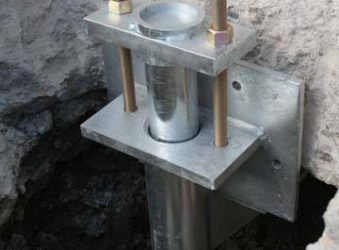
DO HOMES IN CHARLOTTE NEED HELICAL PIERS?
Depending on where you live in NC, chances are you have helical piers in the foundation of your home. An engineer is required to be involved in their installation and...
Depending on where you live in NC, chances are you have helical piers in the foundation of your home. An engineer is required to be involved in their installation and repair in North Carolina. A crack that is bigger than 1/8” usually indicates helicals will be needed on a slab.
Helical piers, also known as piles or screwpiles, are used in both pre-existing and new foundations to prevent the shifting or weakening of a foundation. Better yet, contrary to what one might think, rather than adding more time to building the process of a new structure, helical piers actually minimizes installation time, requires little soil disturbance and transfers the weight of your home or office building to load bearing soil.
By design, the helical piers are typically a steel shaft that works with a helical shaft -the helical actually looks somewhat like plates or large metal washers that are interspersed along the length of the shaft- to better support the weight of your home. They will often be added to an older home when cracking is discovered in your drywall, foundation or home’s exterior. In a commercial design, helicals will be installed where a soil’s status report reveals that a deep foundational system is needed or when over excavating to support the weight of the building.
If you own a home in Charlotte, NC and are uncertain as to whether its foundation is solid or if you should consider having helical piers added, then look for these tell-tale signs:
- Windows and doors that are sticking or hard to open
- Large gaps in the window and door frames
- Interior plaster walls are cracking
- Multiple nail pops are appearing in ceilings and walls
- Walls are noticeably beginning to lean
- Floors are beginning to settle and become uneven
- Chimneys are tilting or leaning
- Cracks can be seen in the foundations or basement walls
TYPES OF HELICAL PIERS
Helical piers are typically divided into two types – square shafts or round shaft – and while each of them is designed to add to the support of a structure, each of them has specific advantages that make them more suited for scenario versus another.
Round Shaft Helical Piers:
- Larger load capability
- Better ability to resist twisting and deflection
- Excellent lateral stability
Square Shaft Helical Piers:
- High yield and tensile strength
- Larger safety factor
- Greater torque capacity
- Easy to install
Regardless of which type of helical pier is used, either of the screwpiles offer the following features:
- Minimal soil disturbance
- Can be installed in any season
- Not affected by high water or flooding
- Useable in nearly any type of soil
- Can be easily reset or even reused
- Typically cost less than concrete foundations
Because helical piers provide additional structural support to your home, they are an excellent way to add to the longevity of your home – especially if you have property that is prone to flooding! Rather than being concerned about the safety of your home’s foundation, you can rest easy, knowing that your family doesn’t have to be concerned about the house shifting or moving under pressure.
If your home or commercial location is starting to show signs of a weak foundation, then this is not something you want to ignore. Like many other things, the longer you put off taking action, the bigger the project will cost to repair.Contact the pros at Sherrill Structural Repairs today.



